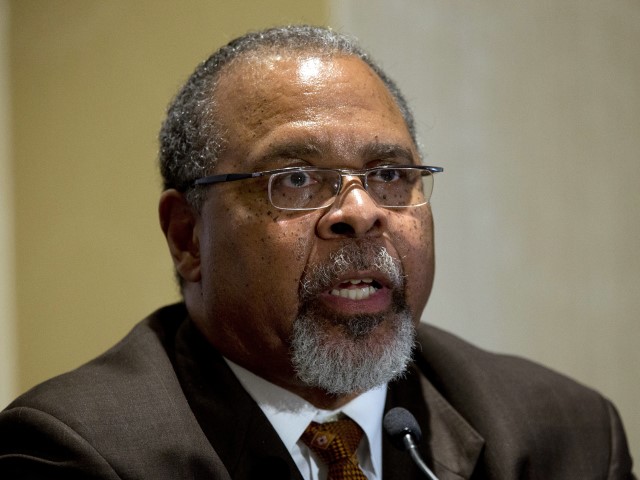Texas is leading the charge to restore historical expressions of faith and patriotism by encouraging “In God We Trust” signs in public schools, which under the Supreme Court’s recent Kennedy decision is almost certain to withstand any legal challenges.
The Lone Star State is pushing back against leftwing secularists, as the legislature passed SB 797, a law that allows the signs to be posted on school walls when those signs are donated, such as by the company Patriot Mobile. The signs are now going up in Houston, Dallas, Ft. Worth, and elsewhere across Texas.
The Supreme Court decided Kennedy v. Bremerton School District in June. One of the court’s holdings in that landmark religious liberty case is that the Establishment Clause – the First Amendment provision that prohibits the federal government from creating a national religion that all Americans must join – must be interpreted according to its historical meaning. In other words, the sorts of stuff that would be establishing a state religion in 1791 is barred by the Establishment Clause, and anything allowed in 1791 should still be allowed today.
Congress adopted “In God We Trust” as the National Motto in 1956. But expressions like that were common from the founding of the United States until recent times.
Benign expressions of faith that convey nondenominational beliefs in a Divine Being who is all-present, all-powerful, and benevolent were ubiquitous at the time of the Founding Fathers. George Washington finished his Inaugural Oath with “so help me God.” The First Congress passed laws creating the offices of House Chaplain and Senate Chaplain, and has always opened every daily session in prayer since 1789, a tradition likewise followed by state and local legislatures. The military has always had chaplains. And displays of the Ten Commandments and crosses in government buildings – including the Supreme Court – and military cemeteries can be found everywhere.
In recent decades the Supreme Court swung to the left, and with it came a series of decisions divorced from the Establishment Clause’s historical meaning. After its 1971 Lemon decision, government actions were deemed unconstitutional if they lacked a primarily secular purpose, advanced religion, or excessively entangled government and religion. After 1989, the test was whether a government action would lead a hypothetical reasonable observer to think government was endorsing religion.
But the Supreme Court began tracking back toward the Constitution’s original meaning in 2005, and completely ignored the Lemon test by the 2014 Town of Greece case (legislative prayer) and the 2019 American Legion case (war memorials). In 2022 it became official in Kennedy that the justices had jettisoned the Lemon test and the endorsement test. Once again, the Establishment Clause carries the meaning that the American people understood it to have when they enshrined it in the Supreme Law of the Land.
So now longstanding expressions of faith can be restored to the public square. Part of that is the National Motto in schools, not in an attempt to evangelize, but instead seeking to promote a unifying message of beliefs widely shared by a large majority of the American people.

The national motto of the United States, “In God We Trust,” is seen painted on a barn along with the American flag. (Don & Melinda Crawford/Education Images/Universal Images Group via Getty Images)
The left may well seek to challenge this display in court. There are a few federal judges in the Lone Star State – especially in the Western District of Texas – where such an argument might get traction. This is especially true because another test – called the coercion test – has been used since 1992 in public schools, giving liberal judges something to hold onto to claim that history is not the sole benchmark when it comes to determining whether a faith-related display or action in schools amounts to a religious establishment.
But even if it does, any case in Texas will then go up to the U.S. Court of Appeals for the Fifth Circuit, America’s most conservative appeals court. The 17-judge Fifth Circuit will almost certainly be faithful in its application of Kennedy, which would clearly permit such displays.
“Years ago I worked with the governor of my state, Ohio’s George Voinovich, to elevate the prominence of our state’s motto, ‘With God All Things Are Possible,’” former Ohio Secretary of State Ken Blackwell, a senior fellow at the Family Research Council, commented exclusively to Breitbart News. “I applaud Texas for taking the same path, shining a spotlight on our National Motto to remind our children that our rights are not grants from government – they are gifts from God!”

In this June 21, 2016, file photo, Ken Blackwell, the Family Research Council’s senior fellow for human rights and constitutional governance, speaks during a news conference. (Mary Altaffer, File/AP)
In an era where children are being indoctrinated by various sorts of leftwing ideology in public schools, Texas lawmakers have decided to push the pendulum back in the opposite direction. And as the country song from the 1990s goes, “God blessed Texas.”
Ken Klukowski is a lawyer who served in the White House and Justice Department, and is a Breitbart News contributor.

COMMENTS
Please let us know if you're having issues with commenting.